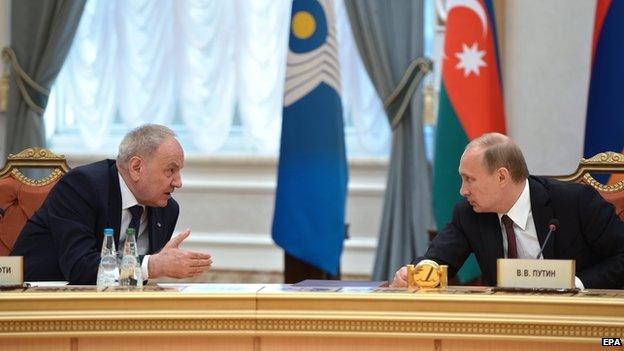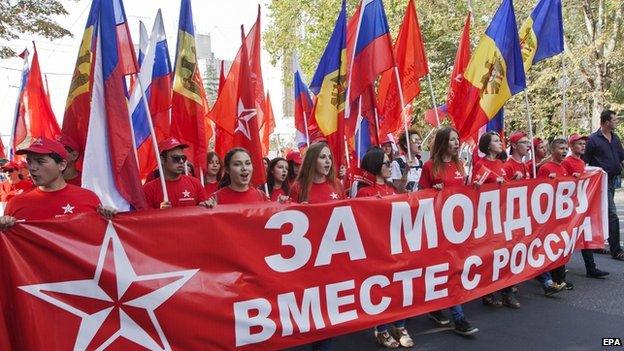Putin wants Russian say in Moldova-EU trade agreement
- Published

President Putin (right) gave a new warning to Moldova's leader in Minsk
Russian President Vladimir Putin has told Moldova that it must take account of Russia's interests before developing closer trade ties with the EU.
Mr Putin was speaking at a summit in Belarus with leaders of ex-Soviet republics, including Moldova.
He said he wanted Moldova to postpone a free trade deal with the EU until 2016, as Ukraine had agreed to do recently.
Russia supports separatists in Trans-Dniester, a long strip of land that broke away from Moldova in 1992.
The pro-Russian separatists are heavily armed and the fighting in eastern Ukraine has raised concern that the frozen conflict in Moldova could similarly reignite.
The EU and US accuse Russia of sending troops and armour into eastern Ukraine to help the rebels there. Russia has repeatedly denied doing so.
Mr Putin warned that economic integration between some ex-Soviet republics and the EU could undermine their preferential trade ties with Russia. He is pushing for a Russian-led Eurasian economic union.
Moldova is one of Europe's poorest countries and has particularly close economic and cultural ties with neighbouring Romania, an EU member.

Last month Moldovan Socialists rallied for closer ties with Russia and against the EU partnership
Russian pressure
In June the EU signed far-reaching partnership deals with Georgia, Moldova and Ukraine.
Moscow is worried that the Russian market could be flooded by cheap goods from the EU that would hit Russian producers.
Last month Russian pressure resulted in the EU and Ukraine agreeing to postpone until 2016 the free trade part of their new partnership agreement.
Russia persuaded the EU to include it in further discussions on the trade deal's possible impact on the Russian economy.
At the Minsk summit on Friday Mr Putin referred to that agreement with the EU and asked: "Where was Moldova? Why couldn't we build a relationship like that with Moldova?
"We wanted to, and asked many times for it. Unfortunately, we haven't heard a clear answer from our Moldovan friends...
"We have to resolve the existing differences and find compromise solutions," he said, adding that such compromises would help "all the member states of the CIS free trade zone" - that is, the ex-Soviet states with which Russia has preferential trade links.
Russia has selectively blocked imports of food and drink from Georgia, Moldova and Ukraine in recent years, moves seen by Western politicians as efforts to exert political control. Russia mostly justified the measures by alleging hygiene violations.